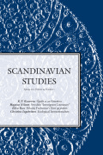
SCANDINAVIAN STUDIES
Scope & Guideline
Advancing Scholarship in Scandinavian Linguistics and Literature
Introduction
Aims and Scopes
- Interdisciplinary Exploration of Scandinavian Culture:
The journal fosters an interdisciplinary approach, integrating literature, history, linguistics, and cultural studies to examine the rich tapestry of Scandinavian heritage. - Focus on Literary Analysis:
A core area of the journal is literary analysis, including examinations of classical texts, narrative techniques, and the evolution of genres within Scandinavian literature. - Cultural and Historical Contextualization:
Papers often contextualize literary works within broader cultural and historical frameworks, analyzing how literature interacts with national identity, migration, and cultural exchange. - Thematic Studies on Identity and Representation:
The journal frequently addresses themes of identity, including national, gender, and ethnic identities, through critical perspectives that highlight the complexities of representation in Scandinavian narratives. - Language and Philology:
The journal also emphasizes the study of language and philology, with contributions that delve into linguistic developments, dialects, and the historical evolution of Scandinavian languages.
Trending and Emerging
- Ecocritical Perspectives:
The rise of ecocritical analysis reflects growing concerns about environmental issues, with literature being examined through the lens of ecology and sustainability. - Gender Studies and Intersectionality:
There is an increasing focus on gender studies, especially intersectional approaches that consider how gender interacts with ethnicity and nationality in Scandinavian literature. - Transnational and Cross-Cultural Studies:
Emerging themes emphasize transnational perspectives, exploring the interconnectedness of Scandinavian cultures with global narratives and influences. - Digital Humanities Approaches:
The incorporation of digital humanities methods in literary analysis is gaining traction, allowing for new ways of engaging with texts through data visualization and computational analysis. - Contemporary Issues in Crime Fiction:
The exploration of contemporary themes in crime fiction, particularly around citizenship, gender, and ethnicity, indicates a shift towards addressing current societal challenges within literary frameworks.
Declining or Waning
- Traditional Folklore Studies:
Research focused on traditional folklore and mythology has diminished, possibly reflecting a shift towards more contemporary themes and issues within Scandinavian studies. - Historical Linguistics:
Although still present, topics specifically centered on historical linguistics appear less frequently, suggesting a potential move away from purely philological studies in favor of broader cultural analyses. - Narrow Geographical Focus:
Papers with a very specific geographical focus on certain regions within Scandinavia have become less common, indicating a trend towards more comprehensive and transnational approaches to Scandinavian studies. - Classical Literature Emphasis:
There is a noticeable decrease in the emphasis on classical texts and their direct analysis, as newer scholarship appears to favor modern and contemporary literature. - Minimalist Literary Criticism:
The use of minimalist literary criticism techniques has waned, with scholars increasingly opting for more complex, multifaceted analytical frameworks.
Similar Journals
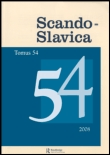
Scando-Slavica
Charting New Territories in Scandinavian and Slavic ResearchScando-Slavica is a renowned academic journal published by ROUTLEDGE JOURNALS, TAYLOR & FRANCIS LTD, specializing in the rich interplay of Scandinavian and Slavic studies. With its ISSN 0080-6765 and E-ISSN 1600-082X, the journal has been a critical resource for scholars since its inception in 1954, covering a wide range of disciplines including archaeology, cultural studies, history, linguistics, and literature. As of 2023, it has consistently ranked in the third quartile across various categories, indicating its influential role in disseminating innovative research within the arts and humanities. With a focus on interdisciplinary dialogue, Scando-Slavica aims to foster a deeper understanding of cultural exchanges and linguistic connections, making it an essential read for researchers, professionals, and students interested in exploring the complexities of Nordic and Slavic interactions. While currently not an open access journal, its contributions have garnered substantial citations, bolstering its academic impact and relevance in a diverse scholarly landscape.
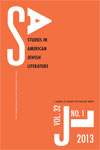
Studies in American Jewish Literature
Advancing Understanding of Jewish Identity in American LiteratureStudies in American Jewish Literature, published by Penn State University Press, is a premier academic journal that delves into the rich tapestry of Jewish literary expression in America. With an ISSN of 0271-9274 and an E-ISSN of 1948-5077, this journal serves a vital role in the fields of Literature and Literary Theory, Cultural Studies, and Anthropology, as evidenced by its placement in the Q1 to Q3 quartiles across various categories in 2023. The journal is a key platform for researchers, professionals, and students interested in exploring the intersection of Jewish identity and American literature, contributing to a deeper understanding of cultural narratives and societal impacts. The publisher's commitment to scholarly excellence ensures that each issue is meticulously curated, showcasing innovative research and critical analysis. While not open access, the journal provides essential insights for anyone engaged in the study of Jewish literature or the broader cultural dynamics at play in American society. Stay informed on contemporary themes and historical contexts that shape literary discourse through this commendable publication.
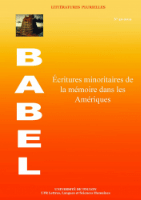
Babel-Litteratures Plurielles
Illuminating the Dynamics of Global Literary DiscourseBabel-Litteratures Plurielles is a prominent peer-reviewed journal published by UNIV SUD TOULON-VAR, specializing in the field of comparative literature and multilingual studies. With an ISSN of 1277-7897 and an E-ISSN of 2263-4746, this Open Access journal has been dedicated to fostering interdisciplinary dialogue since its establishment in 1996. Its mission is to explore diverse literary expressions while examining their cultural implications, making it a vital resource for researchers, professionals, and students who are keen on understanding the dynamics of global literature. The journal’s commitment to accessibility ensures that cutting-edge research is available to a wide audience, promoting scholarly exchange and collaboration within the literary community. Located in La Garde, France, Babel-Litteratures Plurielles continues to contribute significantly to the evolving discourse in literature.
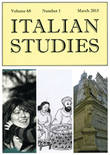
Italian Studies
Uniting Perspectives on History, Language, and the ArtsItalian Studies, published by Routledge Journals, Taylor & Francis Ltd, stands as a distinguished academic platform in the fields of Cultural Studies, History, Linguistics, Language, Literature, and the Visual Arts. Established in 1937, this journal has fostered scholarly dialogue and innovation through its robust contributions and in-depth analyses that bridge historical and contemporary perspectives on Italian culture. With an impressive ranking in Q2 and Q3 quartiles across multiple categories, including Literature and Literary Theory, and a current impact factor reflecting its growing influence, Italian Studies serves as an essential resource for researchers, professionals, and students alike. Although not an open-access journal, it remains accessible via institutional subscriptions, ensuring that a wide audience can engage with its critically acclaimed research and articles. Located in the UK, Italian Studies continues to advance the understanding of Italy's rich cultural heritage, making it a vital cornerstone for those invested in the humanities and social sciences.

Studi Slavistici
Fostering Innovative Perspectives in Cultural StudiesStudi Slavistici is an esteemed academic journal published by FIRENZE UNIV PRESS, focusing on the rich and diverse fields of Cultural Studies, Linguistics and Language, and Literature and Literary Theory. Since its initiation in 2004, it operates under an Open Access model, providing unrestricted access to its contents and fostering a wider dissemination of research. Based in Italy, this journal serves as a vital platform for scholars and researchers engaged in Slavic studies and beyond, encouraging interdisciplinary dialogue and innovative approaches. With its current Quartile rankings in the Q4 category across various domains, it plays a significant role in shaping dialogues within the academic community while offering insights into contemporary and historical perspectives. By maintaining an inclusive vision and engaging with critical issues, Studi Slavistici remains dedicated to advancing knowledge and scholarship in these intricate fields.
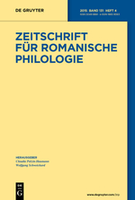
ZEITSCHRIFT FUR ROMANISCHE PHILOLOGIE
Advancing Scholarship in Linguistics and Literary TheoryZEITSCHRIFT FUR ROMANISCHE PHILOLOGIE, published by Walter de Gruyter GmbH, stands as a prominent peer-reviewed journal dedicated to the fields of Linguistics, Literature, and Literary Theory. Established in 1877 and continuing its legacy to the present day, this esteemed journal offers a platform for comprehensive scholarship that explores the intricacies of Romance languages and their literary heritage. With a notable Q1 ranking in Literature and Literary Theory and a Q2 ranking in Linguistics and Language, it has secured its place among leading resources in the humanities. Researchers, educators, and students benefit from its rich historical context and current contributions to the understanding of Romance languages and literature. Though currently not available as Open Access, the journal prioritizes the dissemination of high-quality research, making significant strides in fostering academic dialogue and advancement. Its address at Genthiner Straße 13, Berlin, Germany, situates it in a hub of scholarly activity, bridging the past with contemporary literary discourse.

Estudios Romanicos
Advancing Knowledge in Language, Literature, and TheoryEstudios Romanicos, published by the Universidad de Murcia, is an esteemed open-access journal that has significantly contributed to the fields of Linguistics, Language, Literature, and Literary Theory since its inception in 1978. With an impact factor that elevates it to Q3 in Linguistics and Language and Q2 in Literature and Literary Theory as of 2023, this journal ranks impressively within its categories—placing it in the 76th percentile for Literature and Literary Theory, making it an essential resource for academic discourse. Based in Murcia, Spain, the journal embraces an open-access model, ensuring that its rich content is accessible to a global audience—fostering collaboration and cross-disciplinary research. The convergence of knowledge from diverse linguistic and literary perspectives allows researchers, professionals, and students alike to engage with cutting-edge scholarship and extend the boundaries of their own studies.

Scandia is a distinguished academic journal dedicated to the field of history, published by SCANDIA in Sweden. With its origins dating back to 1976, the journal offers a platform for scholarly discourse, focusing on various historical perspectives and methodologies. Although currently not recognized as an Open Access journal, it fosters a rich exchange of ideas and original research, appealing to historians, researchers, and students alike. Operating within the Q4 quartile of its category for 2023, Scandia holds a significant position in the history landscape, ranking at #1627 out of 1760 in Scopus, representing the 7th percentile. With a commitment to quality scholarship, Scandia encourages contributions that challenge existing narratives and contribute to the broader understanding of historical contexts.
Please send your submissions or inquiries to the editorial office at Historiska Inst, Box 2074, Lund 220 02, Sweden.

Jordan Journal of Modern Languages & Literature
Exploring the Depths of Linguistics and LiteratureJordan Journal of Modern Languages & Literature is a prestigious academic journal published by Yarmouk University, Deanship of Research & Graduate Studies. This journal serves as a vital platform for scholars and researchers in the fields of linguistics and literature, offering a well-rounded examination of modern languages and literary theory. With an impressive Q2 ranking in Linguistics and Language and a Q1 distinction in Literature and Literary Theory as of 2023, it consistently features high-quality research that contributes to the advancement of knowledge in these domains. The Scopus rankings further reflect its academic rigor, placing it in the 79th percentile for Literature and Literary Theory and maintaining significant influence in related fields, making it an essential resource for researchers, professionals, and students alike. Although it does not operate under an open-access model, the journal's commitment to publishing groundbreaking studies can significantly aid in the understanding and progression of modern linguistic and literary practices. The Jordan Journal of Modern Languages & Literature continues to be an influential voice in fostering scholarly dialogue and advancing research in the humanities.
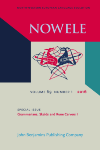
NOWELE-North-Western European Language Evolution
Unveiling the Rich Tapestry of Linguistic ChangeNOWELE-North-Western European Language Evolution, published by John Benjamins Publishing Co, serves as a vital platform for researchers and scholars interested in the evolution and dynamics of North-Western European languages. With an ISSN of 0108-8416 and an E-ISSN of 2212-9715, this journal has been contributing to the field of linguistics since its inception in 1983, with ongoing publications until 2024. Indexed in Scopus and classified in the Q3 category for Linguistics and Language, NOWELE is recognized for its rigorous academic standards and diverse contributions, ranking #485 out of 1088 in the Arts and Humanities category, and #566 out of 1167 in Social Sciences. The journal fosters an open dialogue within the linguistic community, presenting innovative research findings and theoretical advancements. Researchers, professionals, and students alike benefit from its systematic exploration of language evolution in the context of a rapidly changing global linguistic landscape.